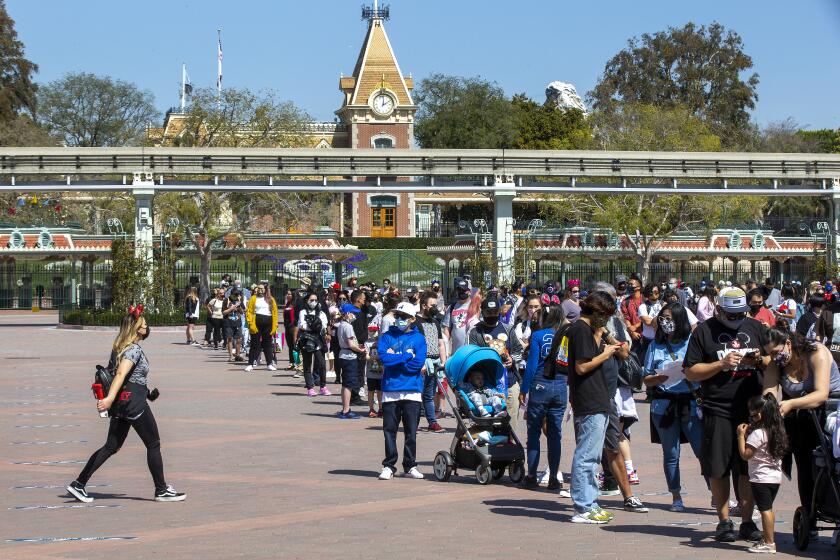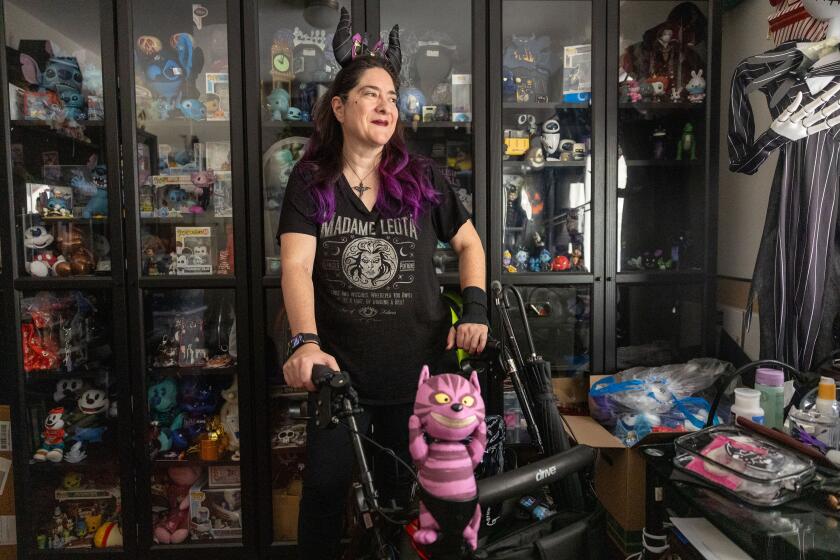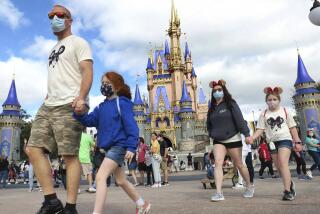Disneyland visitor launches class-action suit over new, stricter disability passes

- Share via
- A San Diego resident filed a 32-page class action complaint against Walt Disney Parks and Resorts along and Inspire Health Alliance.
- Disney made its DAS pass more restrictive last year, which the plaintiff says violates state and federal laws.
Last July, San Diego resident Trisha Malone applied for a disability exemption at a booth just outside the Disneyland and California Adventure theme parks.
The Disability Access Service, or DAS, pass she wanted would have allowed her to avoid waiting in time-consuming lines for popular Disney rides.
Malone met with personnel representing Disney for her DAS application interview. In that public setting, they solicited private medical information from the disabled woman.
After a short exchange, Malone was rejected, as her disability did not meet new, stricter DAS standards.
That denial was detailed in a 32-page class-action complaint Malone filed against Walt Disney Parks and Resorts along with partner Inspire Health Alliance in Orange County Superior Court on Monday.
Malone’s complaint claims Disney breached confidentiality and invaded her privacy, and violated the Unruh Civil Rights Act and several California civil rights codes.
The woman’s attorneys claim in the complaint the new DAS pass standard “unlawfully excludes individuals with other disabilities.” The complaint did not provide any details on the plaintiff’s disability.
Disney ‘reset’ elements of its Disability Access Service program, or DAS, that has become Orlando’s and Anaheim’s most popular service, a spokesperson said.
She is asking Disney to revert to a previous, less restrictive version of DAS pass enforcement. She is also looking for statutory damages, restitution and the cost of attorney’s fees.
Her attorneys did not respond to a phone call requesting comment.
A Disney spokesperson who asked not to be named said the park strives to provide a great experience for its disabled visitors.
“Disney offers a broad range of effective disability accommodations and has worked extensively with experts to ensure that our guests’ individual needs are properly matched with the accommodation they require, and we believe the claims in this complaint are without merit,” the spokesperson said.
Disney’s DAS pass is not a license to skip waiting. Rather, it provides a pass holder a return time for an attraction, where they’ll be placed in line with those who have paid for express, or Lightning Lane, access.
In April, Disney announced it was changing the DAS qualifications. The new wording noted that the DAS program, then the most popular at the park, was “intended to accommodate those guests who, due to a developmental disability like autism or similar are unable to wait in a conventional queue for an extended period of time.”
Some Disney parkgoers and former Disability Access Service pass users say they feel betrayed by the company since changes to the system have taken effect.
The changes went into effect May 20 at Disney World and June 18 at Disneyland.
Older standards were much broader, for guests “who have difficulty tolerating extended waits in a conventional queue environment due to a disability.”
Disney said that as a result of that language, the program’s usage tripled between 2019 and 2024.
It’s these older standards, however, that Malone is requesting.
Malone is suing on behalf of several unnamed disabled clients denied a DAS pass since June 18. She included Inspire Health Alliance, which the lawsuit claims provided nurse practitioners who collaborated with Disney staff to determine DAS pass worthiness.
Malone’s attorneys argue in the complaint that requiring guests to undergo a screening process with eligibility criteria that disproportionately affect individuals with physical disabilities is contrary to California’s Unruh Act and the Americans With Disabilities Act, or ADA.
A variety of individuals told The Times they feel betrayed by Disney, known for its inclusivity, and are reconsidering patronizing its parks after changes to Disney’s Disability Access Service, or DAS, pass.
Unruh bans discrimination by California businesses based on age, ancestry, color, disability, national origin and a variety of other factors.
Disney has maintained in previous interviews with The Times that it offers many accommodations for its disabled guests.
Those include a sensory experience guide to indicate which parts of the park have loud noises, darkness and bumpiness, which rides are fast and which lift off the ground. Disney also offers sign language interpreters, wheelchair and scooter rentals, assistive handheld captioning and video captioning on some rides, and dialogue and narration of scripts on others.
As for ride waiting, Disney offers a “return to queue” process, which allows a party to hold a place in line for a guest with disabilities. There are a few other similar options, including a “location return time” accommodation offered to those in wheelchairs.
Malone’s attorneys said those accommodations “failed to provide equitable access and imposed undue burdens, logistical challenges, emotional distress and safety risks.”
More to Read
Sign up for Essential California
The most important California stories and recommendations in your inbox every morning.
You may occasionally receive promotional content from the Los Angeles Times.













